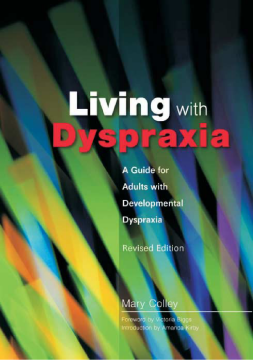
Additional Information
Book Details
Abstract
This book provides a diverse range of basic information and practical advice for adults with dyspraxia. Colley is able to describe in detail the impact that coordination and motor learning difficulties can have on many everyday activities, including cooking, shopping, sewing, gardening and swallowing medicines. This book provides a very readable, comprehensive and useful resource for adults with dyspraxia and their carers. It might also be useful for clinicians who are new to the field and have limited practical experience.'
- British Journal of Occupational Therapy
'This concise and interestingly written handbook is aimed at helping dyspraxic adults to understand their condition and its impact on work, study, social relationships and leisure activities. It contains practical tips on everyday living, including voice control, body language, cooking, study skills, driving and self-care. Especially fascinating are the accounts by four dyspraxic adults of their own experiences. I would recommend the book to teachers and parents, student therapists and clinicians (especially those working in a multidisciplinary setting) who need an insight into developmental dyspraxia as experienced by adolescent and adult clients and an overview of the help available.'
- Speech and Language Therapy in Practice
For people with Developmental Dyspraxia, everyday life can pose a multitude of problems. Tasks the majority of people would find simple can often be taxing and fraught with difficulty. Living with Dyspraxia was written to help all adults with Dyspraxia tackle the everyday situations that many people take for granted. It is full of practical advice on everything from getting a diagnosis to learning how to manage household chores. Important topics are addressed, such as self-esteem, whether to disclose your condition within the workplace, how to communicate more effectively and also how Dyspraxia often interacts with other conditions, such as Dyslexia, ADHD and Asperger's Syndrome.
This practical resource will be of use to adults with Dyspraxia, the professionals and families members who come into contact with them as well as those who simply wish to learn more about Dyspraxia.
`This book provides a diverse range of basic information and practical advice for adults with dyspraxia…Colley is able to describe in detail the impact that coordination and motor learning difficulties can have on many everyday activities, including cooking, shopping, sewing, gardening and swallowing medicines…This book provides a very readable, comprehensive and useful resource for adults with dyspraxia and their carers. It might also be useful for clinicians who are new to the field and have limited practical experience.'
British Journal of Occupational Therapy, April 2007
Mary Colley was diagnosed with Dyspraxia, as well as ADHD and Dyslexia, in her mid-forties. She helped set up the Dyspraxia Foundation Adult Support Group, and achieved a Diploma in Specific Learning Difficulties at the Hornsby Centre. She went on to help form DANDA (Developmental Adult Neuro-Diversity Association) a charity working with adults with dyslexia, dyspraxia, Asperger's Syndrome, AD(H)D and related syndromes. She campaigned tirelessly to raise awareness of Dyspraxia and other specific learning disabilities, via print, radio and national media.
`This concise and interestingly written handbook is aimed at helping dyspraxic adults to understand their condition and its impact on work, study, social relationships and leisure activities. It contains practical tips on everyday living, including voice control, body language, cooking, study skills, driving and self-care…Especially fascinating…are the accounts by four dyspraxic adults of their own experiences. I would recommend the book to teachers and parents, student therapists and clinicians (especially those working in a multidisciplinary setting) who need an insight into developmental dyspraxia as experienced by adolescent and adult clients and an overview of the help available.'
Speech and Language Therapy in Practice
The book offers excellent advice throughout numerous areas of difficulty including organisation of both self and home, communication and relationships, leisure activities, study skills and very useful tips on how to cope with the workplace.
The clarity with which the information is presented, not only helps those who struggle to cope with Dyspraxia, but also enables those with a wider interest in improving generic provision to understand the day to day issues faced by the adult with DCD/Dyspraxia. The information given is both positive and practical.
Patoss
Table of Contents
| Section Title | Page | Action | Price |
|---|---|---|---|
| Prelims (Contents, Photographs and Figures, Tables, Preface, Acknowledgements, Notes to the User, Acronyms and abbreviations) | |||
| 1. Introduction; Field operations manual | |||
| 2. Annexes |
